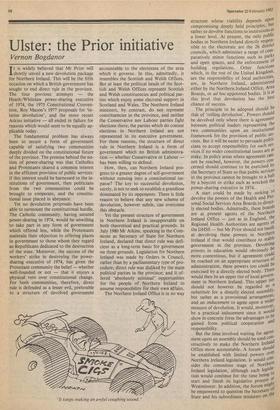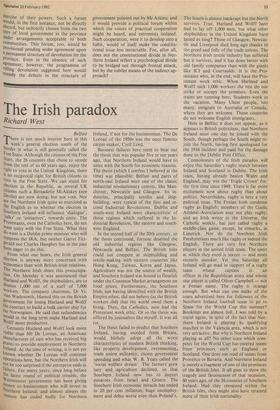Ulster: the Prior initiative
Vernon Bogdanor
It is widely believed that Mr Prior will shortly unveil a new devolution package for Northern Ireland. This will be the fifth occasion on which a British government has sought to end direct rule in the province. The four previous attempts — the Heath/Whitelaw power-sharing executive of 1974, the 1975 Constitutional Conven- tion, Roy Mason's 1977 proposals for 'in- terim devolution', and the more recent Atkins initiative — all ended in failure for reasons which would seem to be equally ap- plicable today.
The fundamental problem has always been to secure a form of government capable of satisfying two communities deeply divided on the constitutional future of the province. The premise behind the no- tion of power-sharing was that Catholics and Protestants shared a common interest in the efficient provision of public services: if this interest could be harnessed to the in- stitutions of government, then politicians from the two communities could be brought to cooperate, and the constitu- tional issue placed in abeyance.
Yet no devolution proposals have been able to surmount the constitutional hurdle. The Catholic community, having secured power-sharing in 1974, would be unwilling to take part in any form of government which offered less, while the Protestants maintain their objection to offering places in government to those whom they regard as. Republicans dedicated to the destruction of the state. Moreover, the success of the workers' strike in destroying the power- sharing executive of 1974, has given the Protestant community the belief — whether well-founded or not — that it enjoys a physical veto over constitutional change. For both communities, therefore, direct rule is defended as a lesser evil, preferable to a structure of devolved government accountable to the electorate of the area which it governs. In this, admittedly, it resembles the Scottish and Welsh Offices. But at least the political heads of the Scot- tish and Welsh Offices represent Scottish and Welsh constituencies and political par- ties which enjoy some electoral support in Scotland and Wales. The Northern Ireland ministers, by contrast, do not represent constituencies in the province, and neither the Conservative nor Labour parties fight elections there; the parties which do contest elections in Northern Ireland are not represented in its executive government. For these reasons, the structure of direct rule in Northern Ireland is a form of government which no British administra- tion — whether Conservative or Labour has been willing to defend.
How, then, can Northern Ireland pro- gress to a greater degree of self-government without running into a constitutional im- passe? The key to successful devolution, surely, is not to seek to establish a grandiose dominated by its opponents. There is little reason to believe that any new scheme of 'devolution, however subtle, can overcome this obstacle.
Yet the present structure of government in Northern Ireland is insupportable on both theoretical and practical grounds. In July 1980 Mr Atkins, speaking in the Com- mons as Secretary of State for Northern Ireland, declared that direct rule was defi- cient as a long-term basis for government on three grounds. Legislation for Northern Ireland was made by Orders in Council, rather than by a parliamentary type of pro- cedure; direct rule was disliked by the main political parties in the province; and it of- fered 'absolutely minimal' opportunities for the people of Northern Ireland to assume responsibility for their own affairs.
The Northern Ireland Office is in no way
'It keeps making an awful coughing sound.'
structure whose viability depends upon compromising deeply held principles, but rather to devolve functions to institutions at a lower level. At present, the only public bodies in Northern Ireland directly resPon- sible to the electorate are the 26 district councils, which administer a range of com- paratively minor functions such as parks and open spaces, and the enforcement of building regulations. Other functions which, in the rest of the United Kingdom, are the responsibility of local authorities, are, in Northern Ireland, administered either by the Northern Ireland Office, Area Boards, or ad hoc appointed bodies. It is at this level that devolution has the best chance of success. The principle to be adopted should be that of 'rolling devolution'. Powers should be devolved only where there is agreement between political leaders representing the two communities upon an institutional framework for the provision of public ser- vices. But it will be easier to persuade politi- cians to accept responsibility for such ser- vices if no wider constitutional issues are at stake. In policy areas where agreement can- not be reached, however, the powers con- cerned should continue to be exercised by the Secretary of State so that public services in the province cannot be brought to a halt by a boycott or strike such as wrecked the power-sharing executive in 1974. A start could be made by seeking to devolve the powers of the Health and Per- sonal Social Services Area Boards to direct- ly elected bodies. Admittedly, these boards are at present agents of the Northern Ireland Office — just as in England, the Regional Health Authorities are agents of the DHSS — but Mr Prior should not baulk at devolving these powers in Northern Ireland if that would contribute to stable government in the province. Devolving powers in education would obviously be more contentious, but if agreement could be reached on an appropriate structure of administration, these powers too could be exercised by a directly elected body. There would then be an upper tier of local govern- ment in Northern Ireland. This upper der should not however be regarded as a substitute for a directly elected assembly, but rather as a provisional arrangement, and an inducement to agree upon a wider measure of devolution. It would, moreover, be a practical inducement since it would show in concrete form the advantages to be gained from political cooperation and responsibility. But the time involved waiting for agree- ment upon an assembly should be used con- structively to make the Northern Ireland, Office more accountable. A forum should be established with limited powers over Northern Ireland legislation. It would con- sider the committee stage of Northern Ireland legislation, although such legisla- tion would continue for the time being t° . start and finish its legislative process Westminster. In addition, the forum might be empowered to question the Secretary cu. State and his subordinate ministers on 0' exercise of their powers. Such a forum would, in the first instance, not be directly elected, but indirectly chosen from the two tiers of local government in the province under arrangements acceptable to both communities. This forum, too, would be provisional pending wider agreement upon a permanent structure of devolution for the Province. Even in the absence of such agreement, however, the programme of rolling devolution suggested here would remedy the defects in the structure of
government pointed out by Mr Atkins; and it would provide a political forum within which the voices of practical cooperation might be heard, and extremists isolated. Such cooperation, were it to develop into a habit, would of itself make the constitu- tional issue less intractable. For, after all, does not the constitutional divide in Nor- thern Ireland reflect a psychological divide to be bridged not through frontal attack, but by the subtler means of the indirect ap- proach?







































 Previous page
Previous page